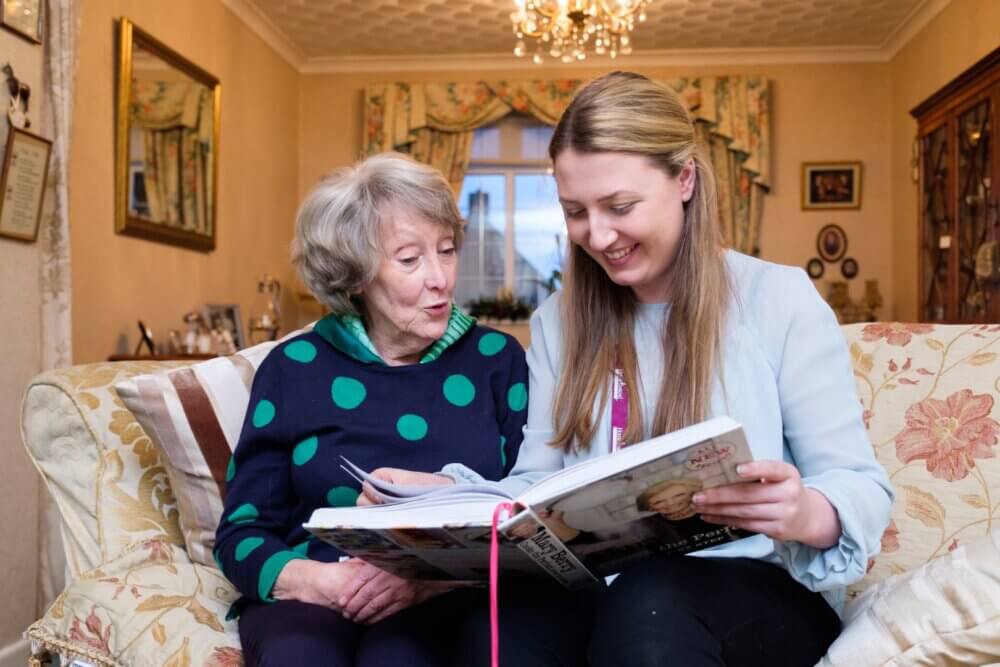Protecting Our Loved Ones: Free Scam Awareness Sessions from Home Instead Romford

As we get older, our connection to the world around us becomes more and more important. But that connection also makes us more vulnerable to those who would take advantage of our trust. Scams against older adults are on the rise, and for those living with dementia or Alzheimer’s, the risks are even higher. At Home Instead Romford, we want to protect our community. That’s why we are offering free scam awareness sessions to help protect our elderly loved ones.

The Threat: Why Scam Awareness is Key for Seniors
Scammers often see older adults as easy targets. Whether it’s a phone call from a “trusted” source or an email asking for personal information, these tactics can be deadly. For seniors, especially those with memory-related conditions, the ability to recognise and resist these scams can be impaired.
Dementia and Alzheimer’s can affect judgement, memory, and decision-making skills, making it easier for scammers to exploit these vulnerabilities. Loved ones of those affected by these conditions need to be extra vigilant. By educating ourselves and our elderly relatives about the dangers of scams, we can add an extra layer of protection.

What Our Scam Awareness Sessions Cover
Home Instead Romford’s scam awareness sessions are designed for older adults and their families. These sessions will give you vital information and practical tips to keep your loved ones safe. Here’s what you’ll get:
- Recognising Common Scams: We will show you the most common scams targeting older adults, such as fake charity appeals, lottery scams, and fraudulent calls from banks or government agencies.
- How Scams Target Vulnerabilities: Learn how scammers exploit the challenges faced by those with dementia or Alzheimer’s and how they use these conditions to their advantage.
- Practical Safety Tips: We’ll give you actionable advice on how to prevent scams, including never sharing personal information over the phone, being cautious with unsolicited emails or letters, and having a trusted family member review any suspicious communications.
- How Loved Ones Can Help: Family members and carers play a big role in protecting elderly individuals from scams. Our sessions will cover monitoring financial transactions, setting up safeguards, and keeping open lines of communication so any suspicious activity is caught early.
- Resources and Support: If you or your loved one has been targeted by a scam, it’s important to know where to turn. We’ll give you information on how to report scams and where to find support and advice.

Why Not Come Along?
Our scam awareness sessions are more than just information; they are a lifeline for those who may be vulnerable to scams. Whether you are an older adult, a family member, or a carer, these sessions will give you vital knowledge to prevent financial loss and emotional distress.
For families, understanding the specific risks faced by your loved one with dementia or Alzheimer’s is key. By attending together, you can develop a shared plan to protect against scams and keep your loved one safe and secure.

Be Part of a Safer Community
At Home Instead Romford, we believe every member of our community should feel safe and supported. Our free scam awareness sessions are part of our overall commitment to the wellbeing of our older adults.
Join us at one of our upcoming sessions and get the knowledge and tools to protect yourself and those you care for.
Call us now to continue the conversation and reserve your spot in one of our upcoming scam awareness sessions.

Top Tips for Scam Awareness: Protect Yourself and Your Loved Ones
For individuals unable to attend our scam awareness sessions, we are committed to providing you with essential tips to safeguard yourself and your loved ones from scams. Here are a few practical steps you can take right away:
1. Be sceptical of unsolicited contact.
When you receive an unexpected phone call, email, or letter asking for personal information or money, it’s important to be cautious. Scammers frequently pretend to be reputable institutions, such as banks or government agencies. It is important to always verify the legitimacy of the contact by using official contact details rather than those provided in the unsolicited message.
2. Never share personal information.
It is important to exercise caution when it comes to sharing personal information such as your bank account number, social security number, or passwords. Always verify that you are dealing with a trusted entity before providing any sensitive details over the phone or online. It’s important to be cautious when dealing with scammers who may try to pressure you into making hasty decisions. Take your time and seek advice from a trusted friend or family member if you have any doubts.
3. Beware of “Too Good to Be True” Offers
If something appears too good to be true, it likely is. Exercise caution when encountering offers such as unexpected lottery winnings, “exclusive” investment opportunities, or deals that demand upfront payment. Many individuals employ these strategies to deceive and entice you.

4. Monitor financial statements regularly.
It’s important to regularly monitor your bank and credit card statements for any unfamiliar transactions. Being vigilant and proactive in identifying suspicious activity can help prevent any additional losses. If you come across anything out of the ordinary, make sure to notify your bank right away.
5. Use strong passwords and update them regularly.
It is important to create strong, unique passwords for your online accounts and make sure to change them regularly. It is advisable to refrain from using easily predictable information such as birthdays or simple sequences. It would be wise to utilise a password manager to securely manage and store your passwords.
6. Install and update security software.
Make sure your computer, smartphone, and other devices are equipped with the latest security software to safeguard against malware and phishing attempts. These tools are frequently exploited by scammers to pilfer personal information.
7. Discuss Scam Awareness with Loved Ones
It’s important to have open conversations with your family members regarding the dangers of scams, particularly if they are older or dealing with conditions such as dementia or Alzheimer’s. If they come across any suspicious communications, kindly encourage them to contact you.
8. Know Where to Report Scams
If you or someone you know has fallen victim to a scam, it is crucial to report it promptly to the relevant authorities. If you come across a scam in the UK, feel free to reach out to Action Fraud at 0300 123 2040 or visit their website to report it. Reporting is crucial in helping authorities stay informed about scam trends and take preventive measures to protect potential victims.
These suggestions serve as a foundation for safeguarding yourself and your loved ones against fraudulent activities. Always remember to stay informed and vigilant to protect yourself from fraudsters. While these tips can be helpful, we highly recommend attending one of our scam awareness sessions whenever possible. This will provide you with a deeper understanding and personalised advice on how to stay safe.

Areas We Serve
Chadwell Heath, Dagenham, Gidea Park, Harold Hill, Harold Wood, Havering-atte-Bower, Hornchurch, Noak Hill, Rainham, Romford, Rush Green
RM1 1, RM1 2, RM1 3, RM1 4, RM10 7, RM10 8, RM10 9, RM11 1, RM11 2, RM11 3, RM12 4, RM12 5, RM12 6, RM13 7, RM13 8, RM13 9, RM2 5, RM2 6, RM3 0, RM3 7, RM3 8, RM7 0, RM7 7, RM7 9, RM6 6, RM8 1, RM8 2, RM8 3, RM9 4, RM9 5, RM9 6
10b, Elms House, Church Rd, Romford RM3 0JU
https://www.homeinstead.co.uk/romford-hornchurch-rainham-dagenham/